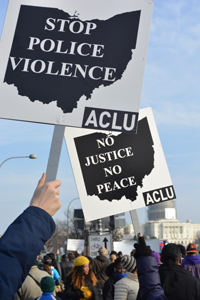Photograph courtesy of Rachel Woods
Change in the Cleveland Division of Police is long overdue.
After the
U.S. Department of Justice publicized its findings from its
most recent investigation of the CDP, the ACLU provided recommendations for how Cleveland police can fix their unconstitutional policies and practices.
Nearly all of our recommendations were taken into consideration and echoed throughout the new agreement with the DOJ and the city of Cleveland.
But we’ve a long way to go before true reform happens. For the CDP to make substantial and lasting changes to its unconstitutional policing methods and biased culture, the division and every one of its officers need to understand and embrace the concept of accountability.
What Being Accountable Means
As you grow up, you learn that when something you do or don’t do hurts someone, the appropriate response is to own up to your mistake and accept the consequences. It’s being accountable. Although we learn this lesson in our youth, we also all know that it doesn’t always play out in reality.
Read our recommendations to the Department of Justice regarding the Cleveland Division of Police.
Check out our latest press release regarding the consent decree between the Cleveland Police and the Department of Justice.
In regards to law enforcement, examples of accountability are more often the exception, rather than the rule. Police officers make mistakes, whether unintentionally or deliberately, go unpunished, and are never corrected for the future. This lack of oversight and discipline fosters an environment where the desire for power and the feeling of invincibility dictate a police officer’s actions, rather than the oath to protect and serve.
Truly Supporting the Police
Police officers are sworn to enforce the law in order to protect and serve our communities, and that often means being placed in dangerous situations. Why wouldn’t we want them trained according to the highest standard? Our tax money pays their salaries, so why wouldn’t we want the reassurance that they’re acting ethically and lawfully?
Did you know that to become a barber in Ohio you must go through at least
1,800 hours of training , but to become a police officer you only need a
That’s unacceptable. Our current approach to policing isn’t only endangering our communities, especially people of color, but also is endangering our police officers.
Respect the Badge
Advocating for greater police accountability and training absolutely demonstrates support for the police. And yet so many individuals, elected officials, and community leaders, perceive the cries for reform as anti-police rhetoric. They misinterpret advocating for a better approach to policing as a threat to the police community. By no means, does asking for police accountability and respecting police authority have to be viewed as mutually exclusive.
The badge must be respected, not only by citizens, but also those who wear it.

